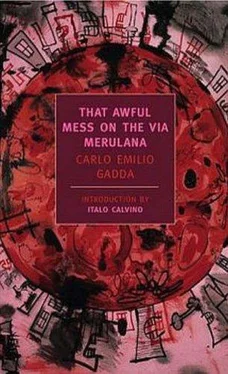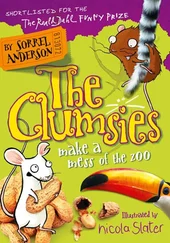"You've got to come to headquarters for a minute; if you keep your mouth shut, nobody'll notice! These are two plainclothesmen, but if you'd rather, I'll take you in myself, without disturbing them to come along as escort. You're Lanciani, Ascanio Lanciani, if I'm not mistaken." So, to avoid any fuss, he had to abandon pork and knives, and leave everything to his aunt. . his grandmother: she was there, hard, erect, with one eye, filled with uneasiness, on the crowd, which went by, ignoring it all. He had an order to take the boy to headquarters, Blondie notified her briefly, and he displayed his document a second time: "Lanciani Ascanio" he added. The grandmother, the owner of the business, a middle-aged peasant woman, her hair still black, much thinner, in her wooden and wrinkled face, than her trade should have warranted, seemed uncertain what attitude to adopt: consternated no, but cross: "this boy hasn't done anything wrong, not a thing," she said, "why do you want to take him away?" Requested by Blondie in a low voice, she uttered her own name and surname, address, and showed him her license for the stand. She added, though without any enthusiasm, that she was a young aunt of Ascanio's Mamma. Blondie wrote this data on a piece of paper with a stub of pencil, then pocketed it. They looked like three cousins conversing: nobody paid any attention to them. They were from Grottaferrata, the grandmother admitted, reluctantly: the neighborhood of Grottaferrata, a little settlement known as Torraccio, after le Frattochie: but they had come to Rome eight years ago, yes, near Porta Latina, in the midst of the vegetables, you might say, a country road where there was barely a sign with Via Popolonia written on it, "it's where the truck farmers live, in the sheds. We live there, before the railroad tracks: this way," she gestured, "you can go down through the reeds to the Caffarella swamp."
"A little shed in the midst of the broccoli, and we grow artichokes too." Ascanio slept there with them. They kept him out of charity, in exchange for a little help there at the market. His father. . ha, his father; his brother had been out of a job for two months. "We haven't heard anything from him!" Ascanio, they were trying to help him, poor boy, "the best we can." And she let him go with them, nice and quiet, upon assurance that they would bring him back to her, later. Equally anxious, on their part, to avoid scenes, not only for the customers but for themselves, the two dark-haired angels had moved away from the stand, were waiting farther on: the boy, white in the face after all his shouting, came around the stand, and his new cousin up to his side. This was Blondie's great art: with his head bowed shouldering his way through the crowd, he stumbled, as if by chance, over the character, his character: "Well, look who's here! What are you up to around these parts?" (sotto voce) : "Tickling the ass of the working girls, or the men's wallets? If there's a button off their back pocket, then you've got it made: am I right?" Then, peremptory: "Let's go. The chief wants you: he's got something he wants to say to you." He took him by the arm, looking at the ground, as if he had a serious proposal to make to him.
They came out of the confusion towards Via Mamiani or Via Ricasoli: there was a passageway among the stands of the fish-mongers and the chicken-vendors, where they sell the squid and the cuttlefish and all kinds of eels and meals from the sea, not to mention mussels. The character, and Blondie himself, looked at those mushy polyps of a pale, silvery mother-of-pearl (so delicately burnished in their inner veins), sniffed, though involuntarily, the odor of seaweeds from all the cool dampness, that sense of sky and chloro-bromo-iodic freedom, of bright morning on the docks, that promise of fried silver in the plate against the hunger that already could be called profound. Coils of boiled tripe, one upon the other, like rolled-up rugs, gentle anatomies of skinned kid, red-white, the pointed tail, but ending in its tuft, to signify — beyond contradiction — its nobility: "I'll give it all to you for four lire," the vendor was saying, holding it up in midair: all, that is a half: and the white clumps of romaine, or curly salad greens, live chickens with the eyes peering from a single side, and who see, each one, a quarter of the world, live hens, still and huddled in their cages, black or Belgian or straw-ivory Paduans: yellow-green dried peppers, or red-green, which made your tongue sting just to look at them, and made saliva come into your mouth: and then walnuts, Sorrento walnuts, hazlenuts from Vignanello, and piles of chestnuts. Farewell, farewell, a long farewell. The women, the plump housewives: dark shawl, or grass-green, a safety pin, undone, ouch! to prick the teat of the neighbor a moment: cosi fan tutte. Self-moving pudges, they ambulated with effort from one stand and from one umbrella to the next, from the celery to the dried figs; they turned, they rubbed their respective asses one against the other, groping to open a path, with brimming bags, they choked, gasped, fat carp in a pool trap where the water, little by little recedes, jammed, wrung, trapped for life with all their fat in the eddies of the great comestibles fair.
*** *** ***
Don Ciccio, in the meanwhile, had not been wasting time, either. Having got home at half-past midnight. "Monday March twenty-one, San Benedetto da Norcia," enunciated the calendar from its nail (year's end offering from the baker opposite) with the leaf of two days earlier which Sora Margherita had forgotten to rip off. A big drop of molten metal, the half-hour, from the clock of Santa Maria delle Neve. He went to bed, fell asleep, snored heavily, postponing all further deduction to the morning. When the angry trill broke loose, all of a sudden, in the silence of the sleeping house, bursting unexpected from that old turnip of an alarm clock self-moving on the marble (of the table) to announce the new headaches of the day, there, two knocks, discreet, from the landlady at the door, authenticated the furious admonition of the imbecile: despite the great longing that he had, in his head, to turn over and go on sleeping, they — clock and landlady's summons— dragged him to his feet at six. He slipped, hard-assed, and used to fall from the side of the bed, ker-plonk, like a peasant, on his heels. Stocky, and of sturdy legs, which appeared hairy from the knees down, from the straw-yellow nightshirt with little red parallel lines which bedecked him at night, he used also to repent ipso facto, even before he had appreciated it with his waking mind, that thud: which resounded on the plank floor, despite the wormy little rug, and announced his activist rising to the neurasthenic engineer on the floor below, by waking him with a start. Not even the north wind of the night, as he came home, nor, once in bed, the speedy breeze of dreams had been able to rumple the lambskin mop: black, pitchy, curly and compact: which re-resplendent in the new light, whatever Pestalozzi may have thought, did not require brilliantine. The knotty legs, the portion visible, emitted, indeed, arrowed perpendicular to the skin their hair, equally black, saturated with electricity: like lines of force of a Newtonian or Coulombian field. His eyes still closed, or almost, he slipped on his old slippers: which seemed to wait for him like two little animals crouched on the parquet: waiting for his feet to each his own. He stretched, looking like a guappo recovering consciousness, chain-yawned eight or nine times, until he had dislocated, or almost, his nevertheless mighty mandibles. He concluded each time with a o-am! which seemed definitive and yet wasn't, inasmuch as he began again, immediately afterwards. Tears dropped from his left eye, then his right, slowly slowly, squeezed one after the other by the consecutive yawns, like the two halves of a lemon successively used by the oyster vendor. He gave his head a brief scratching, a review with three nails of the occiput-jungle, zin zin zin, looking like a monkey: and with the automatic motions of a sleepwalker he headed for "the bath." Arriving there, and closing the door with its latch, he could finally unburden himself in the most radical and expeditious of ways of that annoying sensation of trop-plein which marks every morning, and every bladder however elastic and youthful, on the prompt awakening of the owner.
Читать дальше












